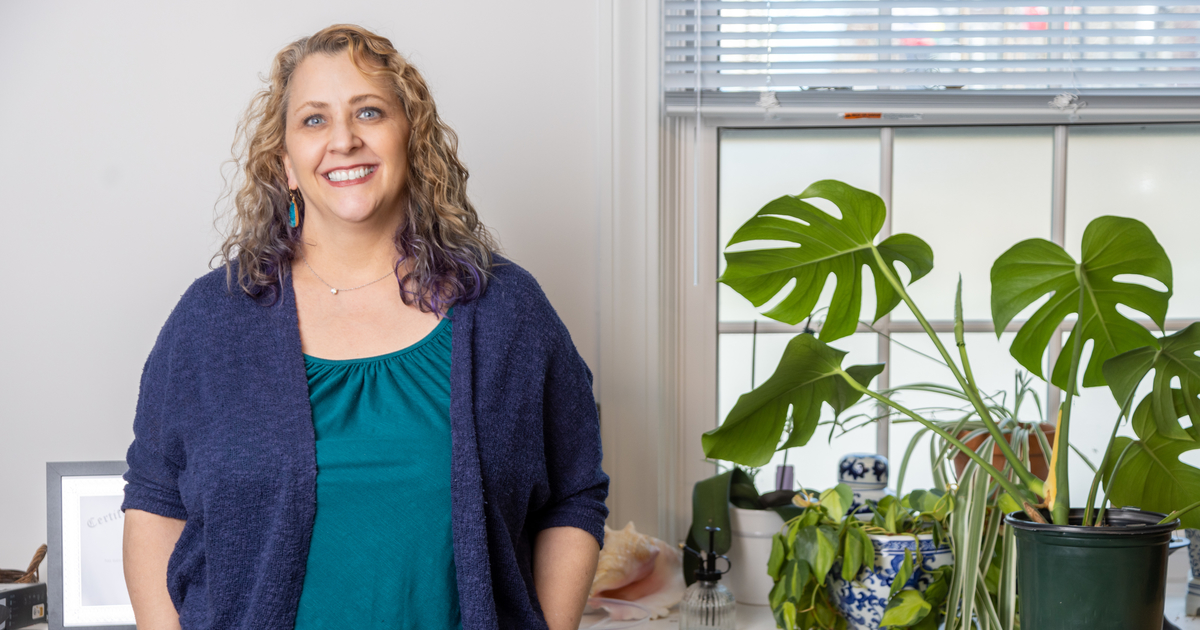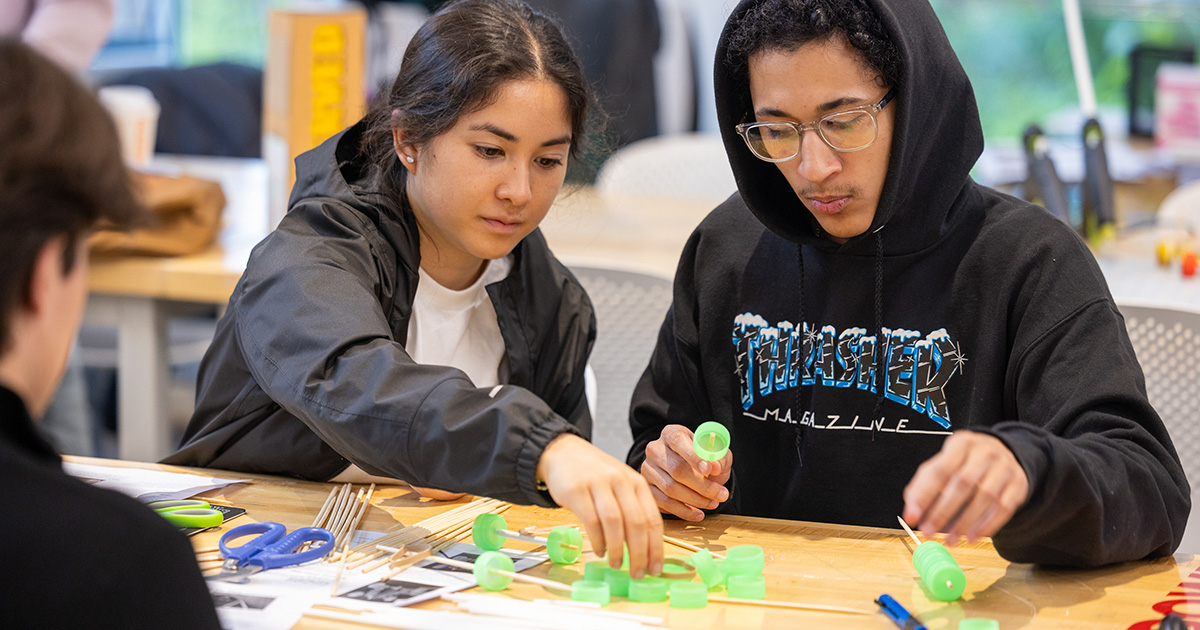Ali Markson’s Heart Is in College Mental Health

Dr. Ali Markson, director of counseling and psychological services at Babson College, has 25 years of experience in a wide range of clinical settings but says she “really found my heart in college mental health.” She joined Babson’s Counseling and Psychological Services (CAPS) in September 2021 after 11 years as the director of the counseling center at Curry College and recently talked to us about college mental health, the challenges facing today’s students, and what Babson is doing to support them.
The Q&A
What interests you about working in the field of college mental health?
“The thing that really speaks to me about college mental health is this developmental transition between adolescence and young adulthood; when undergraduate students come to college, they’re not kids, but they’re not necessarily fully independent adults yet either. As a result, it can really be a big change for them. At Babson, we have such wonderful, driven students navigating questions like ‘Who am I?’ and ‘What am I going to do with my life?’ They’re working through academic expectations, their own expectations of who they want to be, who they feel their families expect them to be, and navigating a range of life skills. Our students do that very successfully, but it doesn’t mean there aren’t some aches and pains along the way. For me, one of the joys in college mental health is supporting students on their journey through college and seeing their resilience and self-empowerment.”
“For me, one of the joys in college mental health is supporting students on their journey through college and seeing their resilience and self-empowerment.”
Ali Markson, director of counseling and psychological services
Do you see a residual impact from the pandemic on students’ mental health?
“I do. I think we’re going to see that for years to come. Students, like everybody, have suffered extreme grief and loss in terms of missed opportunities, missed social connections, missed life milestones. The social isolation during the pandemic has been extremely painful and difficult for so many students and families. We have more students talking about feeling anxious and depressed. They are navigating different social situations, figuring out how to communicate with faculty and their peers. There are a lot of different pieces they are facing concurrently. On the positive side, the stigma historically associated with seeking mental health care has reduced, which is absolutely fantastic, and I couldn’t be happier. I think students are more inclined to seek help now than ever before, which is wonderful.”
What types of college mental health support do students tell you they need the most?
“I think it’s a combination. There’s a subset of students who are looking for on-demand support. College students, regardless of what campus they’re on, tend to use college mental health services like ours episodically. They come in when there’s a crisis, and we will do what I would refer to as a ‘chapter of therapy’ with them. We will work with them on a particular issue—maybe it’s adjustment to college for a first-year student, academic stress, or maybe it’s in relation to a family illness, a loss, or a breakup. As things improve, they’ll say, ‘I’m good,’ and then they’ll pop in later on for another ‘chapter’ when something else comes up. One of the things that I’ve heard a lot from students is they want to be able to access college mental health services when they want it. So we have established slots that we keep every weekday for emergencies. We also offer same-day, non-emergency appointments that are very focused on problem solving—brief support, not to replace the therapy session. In addition to that we have our regular biweekly, individual therapy sessions.”
Tell me about Babson’s enhanced resources through UWill.
“We are really excited about this new resources with UWill, which enables us to offer augmented services to Babson students. Students can register for free telehealth therapy—it takes just a few minutes to register and have access to providers in all 50 states and internationally. Students can choose their provider, and Babson covers the cost of the first two sessions. In addition to the telehealth appointments, students also have access to a 24/7 crisis line. They can call CAPS and be immediately connected to a licensed clinician through UWill. UWill can also connect students to referrals within their platform. So, it’s a great way to quickly get students connected both in the moment for urgent support but also in planning for follow-up support. Within hours of announcing the UWill resources, we had a number of students signed up and registered with the program. On the one hand, I never want any student to be in crisis, but on the other hand, I’m so appreciative that we have this resource and that students can proactively take care of themselves with the help of immediately available support.”
“I’m so appreciative that we have this resource and that students can proactively take care of themselves with the help of immediately available support.”
Ali Markson, director of counseling and psychological services
How do you work with other offices on campus?
“We’re constantly looking at different and creative ways to reach students who are thinking they might want to come to CAPS but they’re not quite ready to make an appointment. With recent outreach initiatives in satellite spaces on campus, we’re available for them to pop in and have a quick conversation with one of us. For example, Dr. James Blue, our assistant director, has consulted this semester with Athletics regarding some of the unique challenges our student-athletes might be facing. Similarly, I offer weekly hours in the grad school. It’s interesting—our undergrads are very quick to seek out services, but our graduate students tend to come a bit later when things are really difficult. So we are experimenting with how we can best help them. My team and I talk a lot about the importance of flexibility in how we provide college mental health services, and how we can make adjustments when it seems clinically appropriate.”
Do you have tips for students as they’re heading into finals or tips for incoming students and their parents?
“College students never get enough sleep. Eat regular meals, drink plenty of water, limit caffeine intake. A consistent schedule is really important, and being clear with yourself about what you can accomplish and when. A good 20-minute walk out in the sunshine really can do a tremendous amount to help reduce stress. It’s important to get out, get out of your own head for a little bit. In many respects, I would suggest the same for incoming students. Sleep is critical. Over the summer, work on establishing good routines to take care of yourself. When you come to campus and everything is feeling new, you’re adjusting, meeting so many new people, and adapting to a college atmosphere, it will help to have some good habits under your belt.”
Two More for Ali Markson
What does Babson mean to you?
“Babson has been a really wonderful place for me. It’s exciting to be at a place where our students are so passionate and so driven. Our campus partners are really accessible and supportive, and I really appreciate the collective dedication to providing services and supporting the needs of our students.”
Right now, what are you …
- Reading? “I just started reading Your Brain on Art, How the Arts Transform Us by Susan Magsamen and Ivy Ross. It’s about how art activates our brains in different ways and factors into our well-being.”
- Listening to? “As a Gen Xer, I very much enjoy a little Duran Duran, Guns N’ Roses, Roxy Music. I also like old standards, too—Sinatra, Billie Holiday, and John Coltrane. I like a lot of different things!”
- Watching? “I just saw a couple of episodes of this new series called ‘The Power’—young women around the world are discovering they can emit electricity from their hands and the global power shift that follows. It’s interesting!”
Posted in Community



